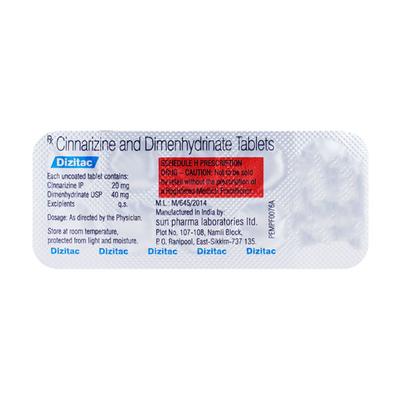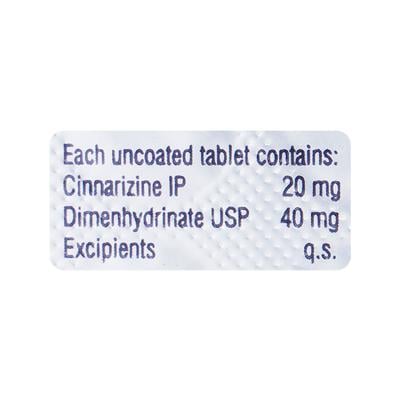

Netmeds First Membership
Quick Links
Introduction About DIZITAC TABLET
DIZITAC TABLET is a combination of Cinnarizine and Dimenhydrinate which belongs to the group of medicines called Antihistamines & Calcium channel blockers respectively. It is used for the short-term, symptomatic management of vertigo associated with Benign Paroxysmal positional vertigo (BPPV) and migraine in adults, who have not responded to alternative managements.
DIZITAC TABLET is not recommended for use in patients having severe kidney and liver problems. Contact your doctor before taking.
Before taking DIZITAC TABLET inform your doctor if you have severe heart disease, lung diseases such as asthma or emphysema.
DIZITAC TABLET is not recommended for use in pregnancy. Contact your doctor before taking. DIZITAC TABLET is not recommended for use in breast feeding women as it may pass through the breast milk. Contact your doctor before taking.
DIZITAC TABLET is not recommended for use in children and adolescents under 18 years of age. Contact your doctor before taking.
[GBNEYWORD] should be used with caution in elderly patients aged (65 years or above). Contact your doctor before taking.
The most common side effects of this medicine are drowsiness, dry mouth, headache and stomach pain. Contact your doctor if any of the symptoms worsen.
Uses Of DIZITAC TABLET
- Used to manage vertigo
How DIZITAC TABLET Works
DIZITAC TABLET helps to manage vertigo, where Cinnarizine blocks the calcium channels, inhibiting smooth muscle contraction and improves microcirculation to inner ear and relieves vertigo or spinning sensation. Dimenhydrinate inhibits histamine H1 receptors and also acts on the chemoreceptor triggering zone in the brain and manages vomiting. Thus, reducing symptoms of vertigo (feeling of dizziness or spinning sensation associated with nausea and vomiting).
How to use DIZITAC TABLET
Take this medicine as advised by your physician. Swallow this medicine as whole with a glass of water and do not crush or chew the medicine. Your doctor will decide the right dose depends on your age, body’s weight and disease condition.
Side Effects Of DIZITAC TABLET
Common
- drowsiness
- dry mouth
- headache
- stomach pain
Uncommon
- sweating
- reddening of the skin
- indigestion
- nausea
- diarrhoea
- nervousness, forgetfulness
- cramps
- tinnitus (ringing in the ear)
- paraesthesia or tingling sensation of the hands or feet, tremors
Rare
- tremors (shaking)
- impaired vision
- allergic reactions (skin reactions)
- light sensitivity
- difficulty in urinating
Stop taking DIZITAC TABLET and contact your doctor immediately if you experience any of the following side effects:
- chest tightness
- yellowish discolouration of skin or whites of the eyes
- increased pressure inside the eye or severe eye pain
- unusual excitement
- convulsions or fitting, uncontrollable movements of the body or face, trembling and shaking of the hands and fingers, twisting movement of the body, muscle stiffness with difficulty walking, stiffness of the arms or legs and severe feeling of restlessness and desire to keep moving
- rash, itching, hives on the skin, swelling of the face, lips, tongue or other parts of the body causing wheezing, difficulty breathing or shortness of breath and severe skin reactions
How To Manage Side Effects
Headache:
Rest and relax. Drink plenty of fluids such as water or electrolytes and apply a pain-relieving balm on the head if necessary. Do not consume alcohol. Contact your doctor if the symptom did not improve.
Nausea or Vomiting:
Take this medicine with, or just after meals. Stick to simple meals. Avoid eating oily or spicy foods.
Diarrhoea:
Drink lots of fluids, such as water or fruit juices to keep you hydrated. Do not take any medicine on your own for managing diarrhea. Contact your doctor if the symptom did not improve.
Stomach pain:
Try to rest and relax. Eat small meals but take frequently. Keep a heat pad on your stomach. Contact your doctor if the symptom did not improve.
Warning & Precautions
Pregnancy
DIZITAC TABLET is not recommended for use in pregnant women. Contact your doctor before taking.
Breastfeeding
DIZITAC TABLET is generally not recommended for use in breastfeeding women as it may pass through the breast milk. Consult your doctor before taking it.
Driving and Using Machines
Do not drive or operate any machines if you feel dizziness, drowsiness or sleepy after taking [GBNEYWORD].
Alcohol
Avoid consumption of alcohol while taking DIZITAC TABLET because it may make you tired or sleepy.
Kidney
DIZITAC TABLET is not recommended for use in patients with severe kidney disease. Contact your doctor before taking.
Liver
DIZITAC TABLET is not recommended for use in patients with severe liver disease. Contact your doctor before taking.
Allergy
Do not take DIZITAC TABLET if you are allergic to Cinnarizine, Dimenhydrinate or any other ingredients of this medicine.
Lungs
DIZITAC TABLET should be used with caution in patients with lung diseases such as asthma or emphysema. Contact your doctor before taking.
Heart Disease
DIZITAC TABLET should be used with caution in patients with severe heart diseases. Contact your doctor before taking.
Others
DIZITAC TABLET is not recommended for use if you have:
- angle-closure glaucoma
- convulsions
- increased pressure in the brain
- urine retention due to prostate problems
Before taking DIZITAC TABLET, inform your doctor if you have:
- low or high blood pressure
- raised pressure in the eye
- obstruction in the bowels or pyloroduodenal obstruction
- an enlarged prostate
- an overactive thyroid
- Parkinson’s disease or tremor
- depression
- porphyria
Use in pediatrics:
DIZITAC TABLET is not recommended for use in children and adolescents under 18 years of age. Consult your doctor before taking.
Use in geriatrics:
DIZITAC TABLET should be used with caution in elderly patients (aged 65 years above). Contact your doctor before taking.
Interactions
A. Drug-Drug interactions:
Inform your physician if you are taking any of the following medicine:
- medicines used to manage depression and anxiety (amitriptyline, nortriptyline)
- medicines used to examine eye (Ex. atropine)
- medicines used to manage cough or blocked nose (Ex. ephedrine)
- medicines used to manage cancer (Ex. procarbazine)
- medicines taken to lower blood pressure (Ex. atenolol, propranolol, diltiazem, verapamil)
- medicines used to manage bacterial infections (gentamicin, vancomycin)
- medicines used to manage heart rhythm disorders (Ex. quinidine, procainamide, sotalol)
- medicines used to manage seizures (phenobarbital, methylphenobarbital)
- medicines used to manage severe pain (morphine and codeine)
- medicines used to manage allergies (Ex. cetirizine, levocetirizine)
- medicines used to manage depression and anxiety (chlorpromazine, haloperidol and monoamine oxidase inhibitors like selegiline, rasagiline, selective serotonin reuptake inhibitors like fluoxetine, paroxetine)
- belladonna alkaloids (used for stomach cramps)
- medicines used to manage Parkinson's disease (benztropine and trihexyphenidyl)
- omeprazole (medicine used for stomach ulcers)
- medicine used to manage pregnancy (Ex. oral contraceptives)
- olanzapine (medicine used to manage psychotic disorders)
- betahistine (medicine used to manage meniere’s disease)
Overdosage:
If you or anyone else accidentally took too much of this medicine, consult your doctor immediately. Symptoms of overdose are tiredness, dizzy and shaky, dilation of pupils and unable to urinate, dry mouth, facial flushing, faster heart rate, fever, sweating and headache.
Synopsis
| Drug | : | Cinnarizine, Dimenhydrinate |
| Pharmacological Category | : | Antihistamines & Calcium channel blockers |
| Therapeutic Indication | : | Vertigo |
| Dosage Forms | : | Tablet |
More Information
- Keep out of reach of children
- Store DIZITAC TABLET at normal temperature
FAQs About DIZITAC TABLET
Q: How DIZITAC TABLET works?
A: DIZITAC TABLET helps to manage vertigo, where Cinnarizine blocks the calcium channels, inhibiting smooth muscle contraction and improves microcirculation to inner ear and relieves vertigo or spinning sensation. Dimenhydrinate inhibits histamine H1 receptors and also acts on the chemoreceptor triggering zone in the brain and manages vomiting. Thus, reducing symptoms of vertigo (feeling of dizziness or spinning sensation associated with nausea and vomiting).
Q: Can I use DIZITAC TABLET in children?
A: No. DIZITAC TABLET is not recommended for use in children and adolescents below 18 years of age. Consult your doctor before taking.
Q: What are the possible common side effects of taking DIZITAC TABLET?
A: The most common side effects of this medicine are drowsiness, dry mouth, headache and stomach pain. Contact your doctor if any of the symptoms worsen.
Q: Can I consume alcohol while using DIZITAC TABLET?
A: No. Avoid consumption of alcohol while taking DIZITAC TABLET because it may make you tired or sleepy.
Q: Can I use DIZITAC TABLET in enlarged prostate?
A: No. DIZITAC TABLET is not recommended for use in patients with enlarged prostate as it may cause difficulty in urination. Contact your doctor before taking.
Q: Does DIZITAC TABLET cause depression?
A: Yes. DIZITAC TABLET may cause depression in some individuals and it should be used with caution in patients with history of depression. Contact your doctor before taking.
References
1. K.D. Tripathi. Autocoids and related drugs, Antiemetic, prokinetic and digestant drugs. Essentials of medical pharmacology. Seventh edition. 2013. Page- 168,663.
2. Arne-Wulf Scholtz, Justus Ilgner Benjamin Loader, Bernd W. Pritschow, and Gerhard Weisshaar. Uses of Cinnarizine and dimenhydrinate. NIH National Library of Medicine, National center for biotechnology information. Pubmed.gov. December 2015. [Accessed on 30th May 2022] https://www.ncbi.nlm.nih.gov/pmc/articles/PMC4875047/
3. Hennig Arzneimittel. Cinnarizine and Dimenhydrinate. [Revised on September 2012] [Accessed on 30th May 2022] https://www.drugs.com/uk/arlevert-tablets-leaflet.html
4. Southern Cross Pharma Pty Ltd. Cinnarizine and Dimenhydrinate. [Revised on December 2018] [Accessed on 30th May 2022] https://www.tga.gov.au/sites/default/files/auspar-cinnarizine-dimenhydrinate-191112-pi.pdf
5. Southern XP Pty Ltd. Cinnarizine and Dimenhydrinate. [Revised on July 2021] [Accessed on 30th May 2022] https://www.nps.org.au/assets/medicines/500e3988-198a-40f2-90e2-ab9600fbfd3c.pdf
6. Cinnarizine and Dimenhydrinate. Mims.com. [Accessed on 30th May 2022] https://www.mims.com/philippines/drug/info/dimezine?type=full
7. Cinnarizine and Dimenhydrinate. Centaur pharma. [Revised on January 2021] [Accessed on 30th May 2022] https://www.centaurpharma.com/downloads/2021/entchestphysician/vertigo/Vertidiz%20tablet.pdf









